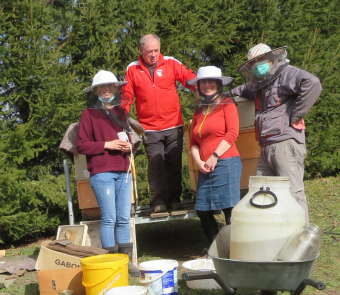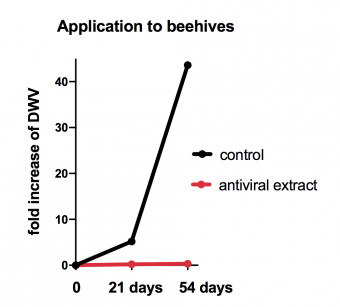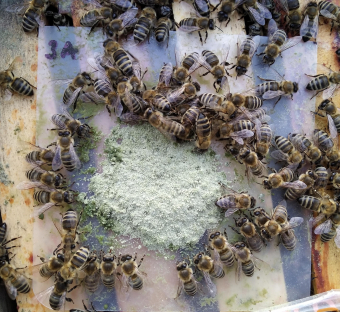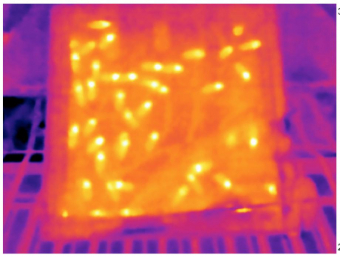- Home
- About Faculty
- Departments
- Department of Molecular Biology and Genetics
- Research
- Laboratory of Bee Biology
Laboratory of Bee Biology
In our newly established laboratory we focus not only on basic research but also on practical applications useful for everyday beekeeping. We investigate how bee nutrition and the way bees are managed by beekeepers influence the development of viral infections and other diseases. We consider thermoregulation as one of the key parameters that define the honey bees resistance to diseases.
Head of the laboratory: RNDr. Alena Krejčí, Ph.D.
Lab members and collaborators
Karolína Svobodová
Adéla Jeslínková
Václav Krištůfek (Institute of Soil Biology)
* Our research runs in close collaboration with the Biology Centre, Department of embeded systems at the University of South Bohemia, Department of plant physiology and with local beekeepers.

Antiviral properties of mushroom and herbal extracts
By testing a series of mushroom and herbal extracts we discovered substances that have a profound inhibitory effects on the loads of DWV virus in the honey bees. We tested these inhibitory properties in cage experiments in incubatotors but also in real beehives. Supplementation of these extracts to winter sugar feeding prevented increase in DWV loads in comparison to the control group. According to our preliminary results the natural extracts have no negative effects on the bee survival. The aim of our study is to use these extracts as a prevention of DWV spread in honey bees.

Nutritional supplement tuned up by the bees

Pollen is critical for the development of honey bee brood and it is one of the key factors promoting the development of a healthy and numerous winter bee generation. However, the supply of pollen could often be limited in certain parts of the year. Using preferential tests we let the bees to decide the composition of a pollen subsitute that is rich in amino acids, vitamins and minerals, being similar to the natural pollen. An important part of the mixture is the Chlorella alage that resembles pollen by its composition and that the bees readily collect and consume. We showed that this nutritional supplement tripled the amount of brood in the beehives when offered to colonies in early spring in comparison to controls. We plan to enriche this nutritional supplement with one of our natural antiviral compounds to develop a balanced pollen substitute with antiviral properties.
Honey bee thermoregulation
Honey bee brood develops optimally at temperature of 34-35°C, while the varroa mite prefers lower temperature of 32.6-33.5°C. Therefore the mites fertility is already compromised at the optimal bee brood temperature. Under longer exposures to heat shock temperatures above 42°C the mites die while the bees are minimally affected. In collaboration with the Department of embeded systems we developed sensitive thermosensors for monitoring temperature inside the brood cells. Our data indicate that the ability of bees to regulate brood nest temperature appears more flexible than anticipated.

Study at the Faculty
-
Grading system
-
Study and Examination Code
Branišovská 1645/31a, 370 05 České Budějovice Tel. 387 776 201 | This email address is being protected from spambots. You need JavaScript enabled to view it.
Branišovská 1645/31a, 370 05 České Budějovice Tel. 387 776 201 | This email address is being protected from spambots. You need JavaScript enabled to view it.
© 2024 University of South Bohemia
Cookies
1
0



